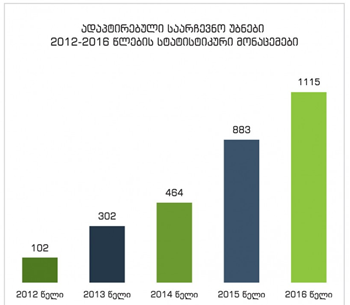Lana Giorgidze
As reported by the Public Defender of Georgia, on the Election Day of the 2016 Parliamentary Elections, 2 blind persons could not vote in the precinct #7 of Varkhani village in Adigeni Municipality. Nevertheless, the amended Election Code guaranteed right to vote for every person in any polling station throughout the country.
“The CEC took measures to create relevant environment in precincts for blind and deaf people to ensure privacy of their votes. Voters, who are partly blind, were provided with magnifying glasses to read better. Voters, who were completely blind, had right to be accompanied by the next voter into the ballot booth to be helped in marking the candidate. All in all, the CEC was proactive to enlarge the access of people with disabilities to the election process”, - IRI report reads.
Unlike the evaluation of the long-term election observers from the International Republican Institute, the international observation mission talks about non-adapted precincts.
“Some polling stations were not up to standard: small and poorly equipped premises were reported from all monitored regions. Some were overcrowded, which caused chaos inside and outside the polling station. In a majority of polling stations there was no proper access for disabled persons”, - the Observatory’s Joint Preliminary Statement on the first round of the Parliamentary Elections reads.
In accordance to the cooperation memorandum signed between the CEC, the Tbilisi City Hall, the Ministry of Regional Development and Infrastructure of Georgia, the Ministry of Education and Science of Georgia in 2015, the institutes took obligations, within their competences, to ensure inclusive election environment for the 2016 elections and to meet the requirements of the Election Code, which requests to allocate appropriate building for the polling station, which will be accessible for everybody; if similar building does not exist in the neighborhood, the building shall be adapted before the Election Day.
As reported by the CEC, for the 2016 Parliamentary Elections, 1 115 precincts out of 3 702 were adapted, which is 1 013 more than in 2012 Parliamentary Elections (in 2012, 102 precincts were adapted). 836 precincts were located in regions and 271 in Tbilisi.
“This year the Election Administration took extraordinary steps to create inclusive election environment. It includes awareness raising of disabled people and offer them special services in the polling stations. Our web page is totally adapted for disabled people. It is first web page, which is adapted according to the international standards. Also, it is very important, that the CEC prepared advertisement clip, which provided information about the services the CEC offered to voters. Our advertisements have sign-interpretation. Although the CEC did not have obligation to adapt the precincts, whilst relevant authorities had this responsibility, we coordinated rehabilitation of the precincts they had assigned to us; consequently, number of adapted polling stations grew from 102 up to 1 115; it implies precincts with wheelchair ramps and buildings which were easy to enter”, - Sopio Sitchinava, the head of Coordination, Planning and Report Department at the CEC, told humanrights.ge.
Sopio Sitchinava said, special booths were placed in the adapted precincts, also the CEC sent two magnifying glasses to every polling station. Sitchinava said it was first time when blind voters could get information from special frame-shape, which was attached to any ballot: “We disseminated posters for deaf people with explanations how to vote in 3 634 precincts”.
Koba Nadiradze, the representative of the NGO Partnership for Human Rights, believes special booths shall not be allocated for disabled people; the main principle of the UN Convention is that all booths shall be accessible for any voter.
“The CEC counts how many precincts were adapted, which is not a criteria for evaluation, because physical environment to access the precinct is more important, that was not addressed. Voters encounter obstacles on their way to precincts, because roads are not adapted, transport is not adapted; there are no parking spaces around precincts for disabled people. Disabled people shall be able to move and vote without anybody’s help in the polling stations”, - Koba Nadiradze told humanrights.ge.
Koba Nadiradze added that all disabled people were not informed how to use the services offered by the CEC in order to vote independently: “The problem is also qualification of the commission members, because they did not have information how to serve disabled voters”.
The head of Coordination, Planning and Report Department at the CEC, Sopio Sitchinava, mentioned that despite significant changes, the rate of participation of disabled people in the ballot was not high and the CEC continues to work in that direction.
“We cooperate with NGOs and international organizations and based on the information they give us, we will be able to eliminate miscarriages in that direction that we had”, - Sopio Sitchinava declared.
The Public Defender of Georgia recommended to comply with the standards of the UN Convention about disabled people in order to ensure equal election environment and independent participation in civil life: “It concerns physical environment and infrastructure, public transport and other facilities, including metro adaptation according to universal design, access to information and communication technologies throughout the country, in the cities and villages”.
News
December 13, 2023
Ethnic minorities outside the peace dialogue
November 6, 2023
‘Peace’ agenda of political parties
Popular
Articles
February 13, 2024




